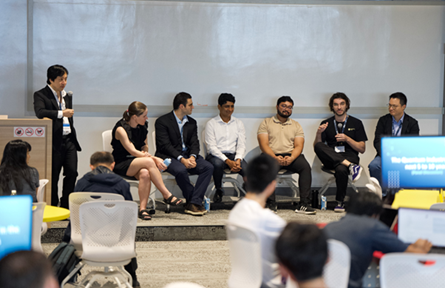IAS Frontiers Conference on Genome Engineering
Adrian Lee | Research Fellow, School of Chemistry, Chemical Engineering & Biotechnology, NTU
The IAS Frontiers Conference on Genome Engineering was held on 13 to 15 November 2024 in Nanyang Technological University (NTU) at the School of Chemistry, Chemical Engineering and Biotechnology (CCEB). Organised by the Institute of Advanced Studies (IAS) and CCEB with support from other schools, colleges, and institutions, it is the sixth meeting in a series of genome engineering conferences that started with Seoul as the first host city/state in 2017, followed by Beijing in 2018, Kobe in 2019, Seoul again in 2022, and Goa in 2023.
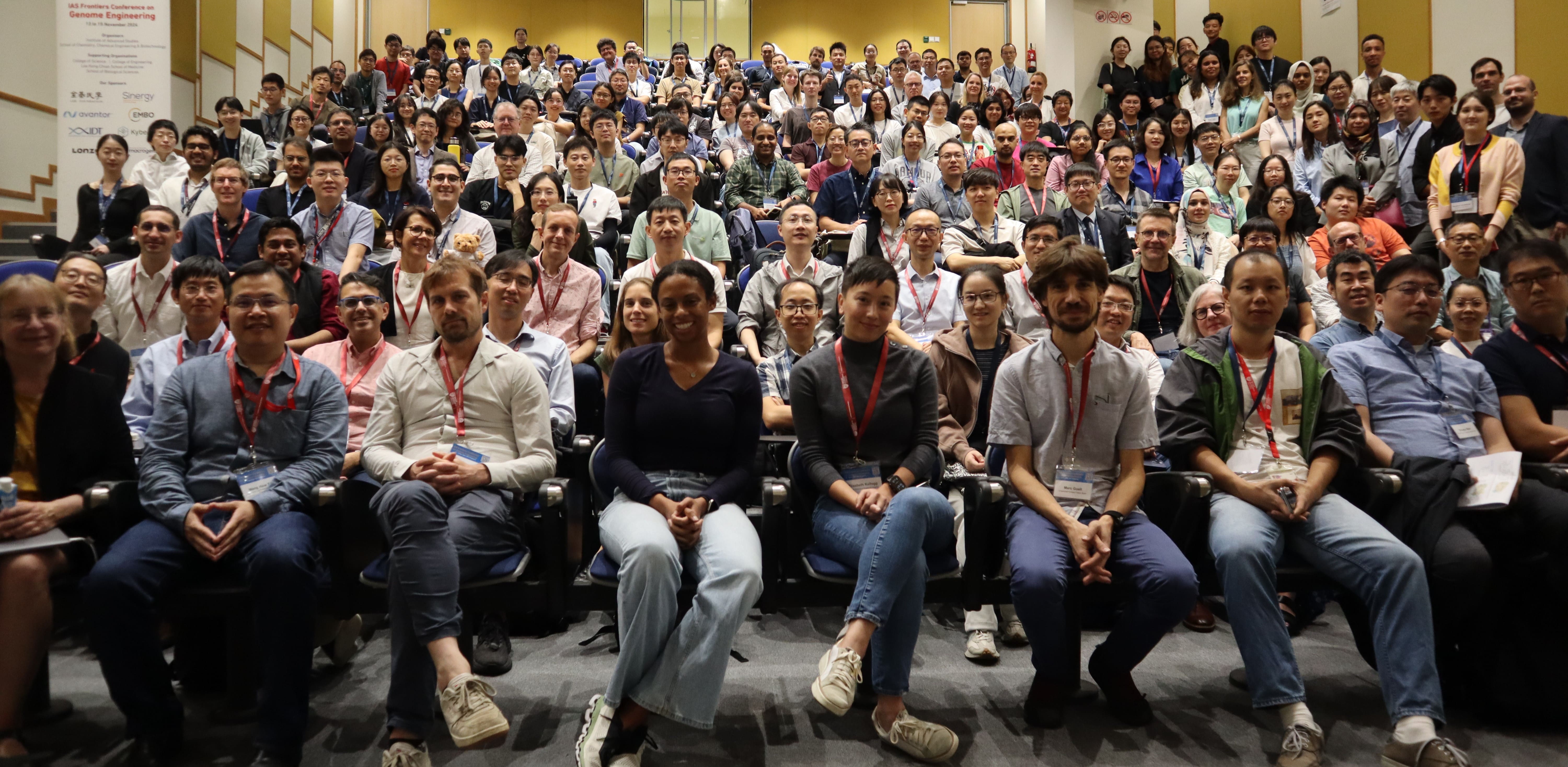
Celebrating the revolutionary CRISPR-Cas system, this conference explored its transformative impact on biotechnology and biomedical science, from its roots in microbial immunity to its 2020 Nobel Prize-winning applications in genome editing. Beyond CRISPR, the conference also highlighted emerging genome engineering technologies, offering a platform for cutting-edge research, novel tools, and collaborative innovation. Around 200 people from around the world attended the conference, including 3 keynote speakers, 30 other invited speakers, 3 industry speakers, and 4 journal editors. In addition, 58 posters were presented, with 4 poster presenters invited to give lightning talks. The invited talks were spread over 8 sessions across the 3 days of the event.
The chairman of the organising committee, Meng How Tan, gave an opening remarks speech with a brief introduction to Singapore and its research landscape. This was followed by the first keynote lecture of the event, given by Maria Jasin about Genetic and Genomic Loss from Chromosomal Double-Strand Breaks. The lecture was highly stimulating and highlighted the importance of monitoring large chromosomal aberration in genome editing experiments. Following the group photo-taking and coffee break, the first invited talk session ensued, with Peter Fineran, Elizabeth Kellogg, Ying Zhang, and Jacob Corn sharing about strategies and mechanisms involving immunity, transposons, DNA topology, and other genome editing-related cellular processes. After lunch, Chase Beisel, Quanjiang Ji, Anna Cereseto, and Le Cong shared about novel CRISPR-Cas systems in the second session, including novel CRISPR-Cas12 systems and single-strand annealing proteins. The third session featured Marc Güell (EMBO Young Investigator Lecture), Prashant Mali, Hui Yang, and Chunyi Hu who covered genome and metagenome engineering concepts. This was followed by two lightning talks by Zehua Bao and Joana Ferreira da Silva.
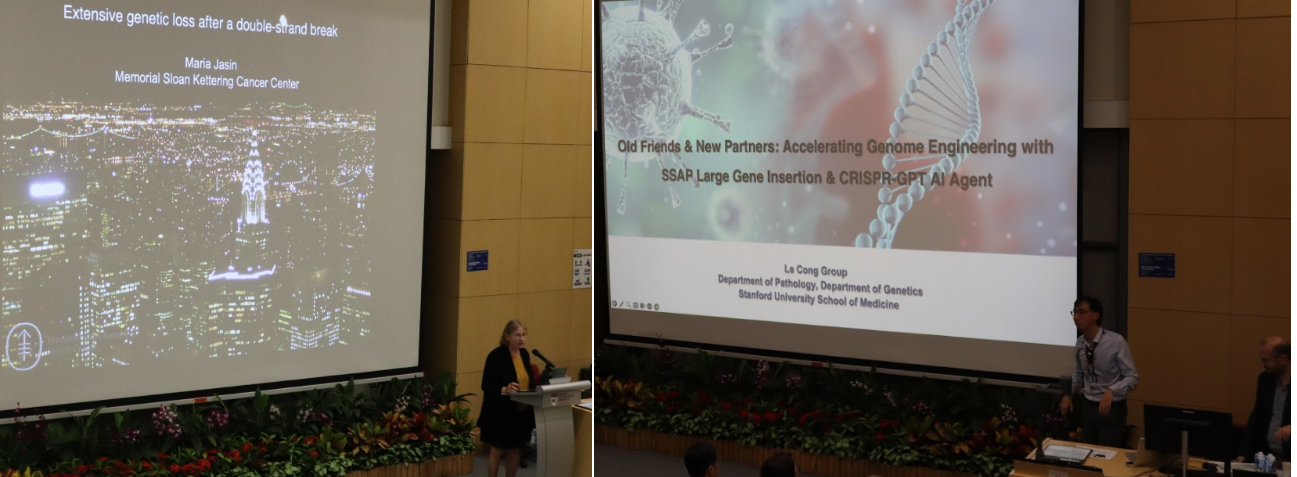
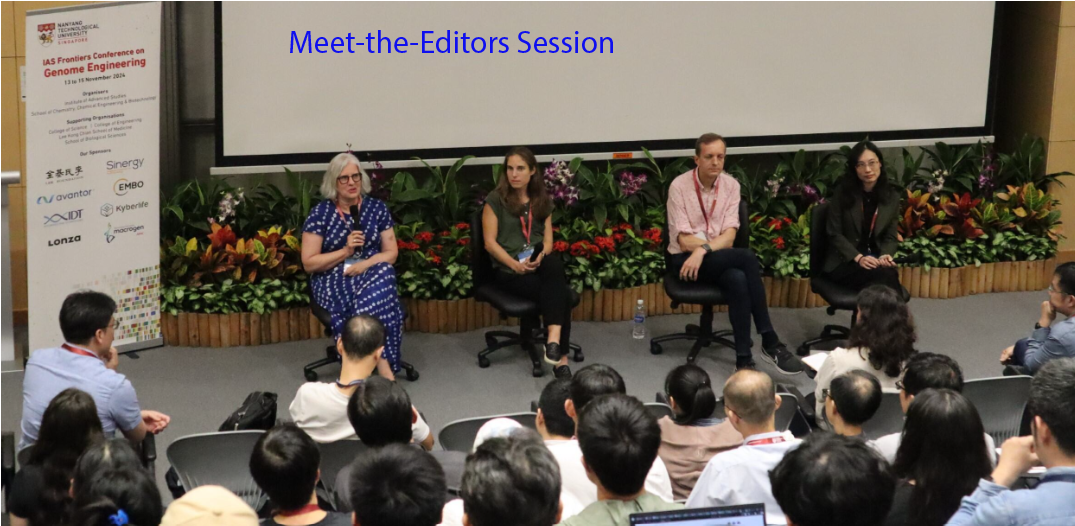
The Meet-the-Editors session featured Barbara Cheifet (Nature Biotechnology), Angela Eggleston (Nature), Pep Pamies (Nature Biomedical Engineering), and Yang Yang (Cell) who gave an engaging and inspiring sharing about the life and challenges of an editing career. The day ended with a poster session cum welcome reception, where scientific discussions remained lively throughout the venue.
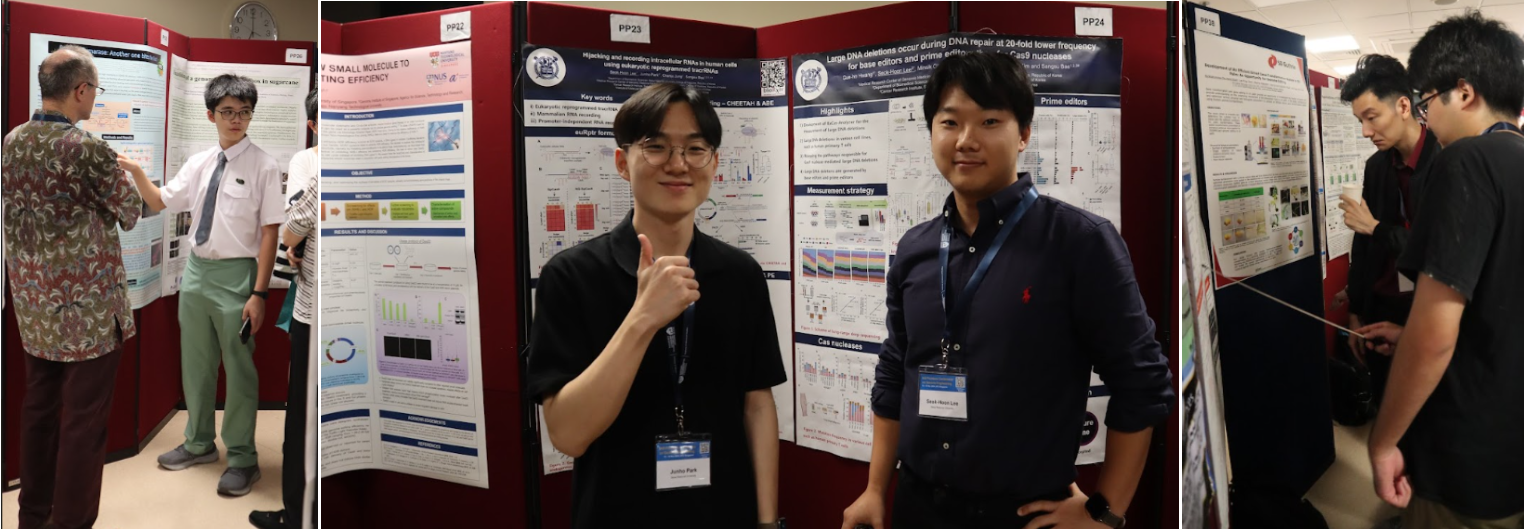
Day two began with a keynote lecture from Virginijus Šikšnys: From Transposition to CRISPR-Cas Antiphage Defense and Beyond. The lecture highlighted the large diversity of bacterial immune systems that can be harnessed for biotechnology applications. Two lightning talks were then presented by Yinqing Li and Kazuto Yoshimi before a coffee break. The subsequent talk session was given by Stanley Qi, Dali Li, Jia Chen, and Debojyoti Chakraborty (EMBO Young Investigator Lecture), engaging the audience with clinical applications of precise genome engineering. Of note was Debo’s sharing of how he tried to translate gene editing therapy to benefit patients in India.
The afternoon session featured Wensheng Wei, Kyoungmi Kim, Gerald Schwank, and Omar Abudayyeh who shared about advancements in therapies as well as applications in animal work. After a coffee break, Hyongbum Henry Kim, Sidi Chen, and Neville Sanjana gave the session about genetic screens using cutting-edge CRISPR technologies. The audience was wowed by how CRISPR-Cas systems could be leveraged on to reveal new biological insights. This was followed by an industry sharing session by Nguyen Kien Truc Giang (Wilmar International), Harshyaa Makhija (LambdaGen Therapeutics), and Michael Winther (Engine Biosciences) with key insights on the latest updates of how CRISPR genome engineering technologies were being applied in the industry sector.
 Neville Sanjana's discussion with the audience and Industry talk by Michael Winther.
Neville Sanjana's discussion with the audience and Industry talk by Michael Winther.
The day concluded with a networking dinner at the Raffles Marina, a beautiful country club and boating facility at the western end of Singapore featuring one of the most popular sunset photograph sites of the country.
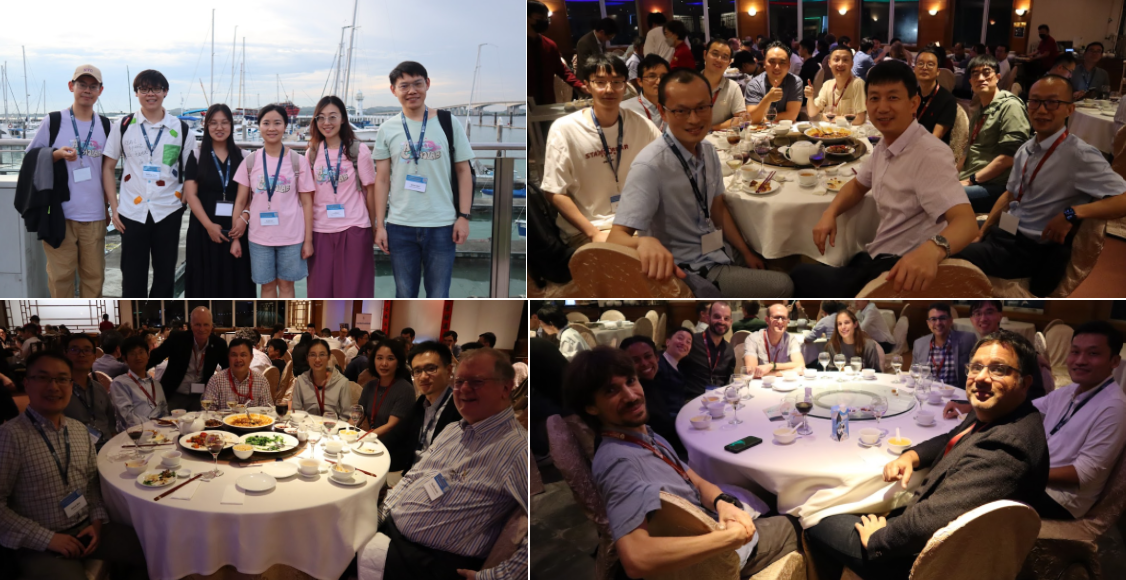
On the final day of the conference, the first invited talk session was presented by Patrick Hsu, Sangsu Bae, and Samuel Sternberg, who shared about new technologies with AI and de novo gene synthesis. Notably, Patrick’s talk demonstrated how AI and deep learning could be effectively tapped to study biological systems. After a coffee break, Caixia Gao, Magdy Mahfouz, Holger Puchta, and Meng How Tan gave intriguing talks involving genome editing in plants as well as new genome editing tools such as pAgo and small molecules that enhanced precise editing.

Following the lunch, the final keynote lecture (as well as CoE Distinguished Speaker Lecture) was given by Daniel Voytas about Plant Gene Editing at Scale Using Non-Transgenic Approaches. With the theme of the day heavily leaning towards genome editing in plants, the event smoothly transitioned into an engaging panel discussion about the role of genome engineering in future foods, featuring Daniel Voytas, Caixia Gao, Zhongchao Yin, and Geoffry Smith as panellists. The event concluded with the poster awards presentation and closing remarks, given by Pu Kanyi (Associate Dean, College of Engineering, NTU).
 [From Left] Prof Pu Kanyi presenting memento to Daniel Voytas (CoE Distinguished Speaker); Panel discussion on the role of genome engineering in future foods.
[From Left] Prof Pu Kanyi presenting memento to Daniel Voytas (CoE Distinguished Speaker); Panel discussion on the role of genome engineering in future foods.
 Proud recipients of the IAS Best Poster Awards.
Proud recipients of the IAS Best Poster Awards.
In conjunction with the conference, Maria Jasin and Virginijus Šikšnys subsequently presented the IAS Lee Kong Chian Distinguished Professor Public Lecture on Genome Engineering (read the article here), which included personal stories of their lives.
The smooth success and experience of the event would not have been possible without IAS, CCEB, other supporting organisations, sponsors, the conference committee, and all assisting crew. The spirit and buzz throughout this event would be fondly remembered for months to come.
"The latest edition of the Frontiers conference on genome editing was an unforgettable three days filled with exceptional scientific rigour. The organisers curated an outstanding lineup of speakers, showcasing cutting-edge advancements in basic research, translational science, computational biology, and applications in both human and plant systems from around the world. Most of the speakers presented unpublished, groundbreaking research and actively engaged in discussions with participants, fostering a collaborative atmosphere. The event also welcomed numerous young researchers from diverse universities, creating excellent networking opportunities to share and discuss work in a relaxed setting. As a researcher focused on clinical applications, this conference has reinvigorated my passion to explore innovative applications for the ever-expanding tools emerging globally in genome editing." - Anila George, Christian Medical College, India.
"Through this fantastic conference, I was very surprised that there was a large number of extraordinary and creative research in the field of genome editing all over the world. Profs Maria Jasin and Jacob Corn taught us that the inhibitors of DNA repair pathways such as NHEJ and MMEJ could induce loss of heterozygosity and large deletion in human cells. Moreover, Profs Omar O. Abudayyeh, Patrick Hsu, and Sangsu Bae presented that AI enabled us to not only evolve proteins such as RNA polymerase, deaminase, and RNA-guided DNA endonuclease but also generate DNA, RNA, and protein sequences from molecular-scale to genome-scale. Prof Patrick Hsu also introduced Bridge Recombination, which was recently reported as a novel genome editing tool, installing exogenous DNA accurately. I expect that AI-generated CRISPR systems will progress immediately in the near future. Finally, winning a Poster Award at this conference highly motivated me to do more interesting research." - Daiki Nagatomo, Kyoto University, Japan.














/enri-thumbnails/careeropportunities1f0caf1c-a12d-479c-be7c-3c04e085c617.tmb-mega-menu.jpg?Culture=en&sfvrsn=d7261e3b_1)

/cradle-thumbnails/research-capabilities1516d0ba63aa44f0b4ee77a8c05263b2.tmb-mega-menu.jpg?Culture=en&sfvrsn=1bc94f8_1)






